




 |
   |
 |
 |
Zillion Tears (1990, 22.40) ***½/TTStep on Sepia DreamAnother Glassy Moment Prisoner Zillion Tears |
Current availability:
Mellotron used:
Rosalia were an all-female Japanese progressive outfit (see: Arsnova) who only managed to release a four-track mini-album, Zillion Tears, in 1990, before splitting. The only member I can tell you anything about is keys lady Naomi Miura, who went on to play with, yes, Arsnova for a while some years later. The EP/mini-album/whatever's a bit of a mixed bag, as you might expect of a Japanese prog release of the era. Amusingly, it manages to cover all the prog bases of the time in twenty-odd minutes, cutting out the middle man by only using each trope once.
Instrumental opener Step On Sepia Dream combines near-dissonance with typically Japanese romance-era classical influences, Another Glassy Moment (these titles are all translations, incidentally) is the cheesy pop/rock number, Prisoner is the UK-esque jazzy one, while the title track is the epic, comparable to Teru's Symphonia and other similar Japanese bands of a few years earlier. Soundwise, the album combines more 'traditional' prog instrumentation with up-to-the-minute digital stuff, including the hilariously low-fi samples that open Prisoner, which can only dream of anything above 8-bit. Instrumental highlights include Miura's 'Hammond' and synth solos on Prisoner and the guitar and synth parts on the title track, but, exactly as you'd expect, no-one puts a foot wrong anywhere.
Miura plays Mellotron strings on every track, to a greater or lesser degree. I've listened to Step On Sepia Dream to try to ascertain whether it's real or sampled (very early for sampling, but not unheard of, particularly in Japan) and have come to the conclusion that she uses the Mellotron for chordal stuff and regular string samples for single notes. This is a textbook case of what's known as 'muddying the issue', I think. Anyway, should you be into Japanese prog (something of an acquired taste, to be honest), you can't go wrong with this, assuming you can actually find a copy. I had to sign up to a Japanese YouTube equivalent to even be able to hear someone's glitchy upload. The things I do for you lot...
See: Arsnova | King's Boards | After the Rain
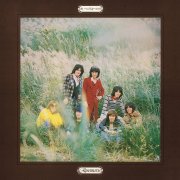 |
Aitsu ni Kiwotsukero! (1973, 36.32) ***/T |
|
| Aitsu ni Kiwotsukero! Ore no Aitsu Seishun no Itami Kawaii Akuma Gōingu Mai Rōdo Ai wa Tokimeku Deki-Gokoro Makku ra Yami |
Seshīru Aishū no Kyōsōkyoku Rōzumarī Uruwashi no Omokage |
|
Current availability:
Mellotron used:
Given the vagaries of transliterating from the Japanese, even the spelling of '70s one-offs Rosemarie's name is up for question. Google Translate give it as Rōzumarī, but, given that it's clearly a Japanese translation of Rosemarie, Rosemarie it is. Their lone album, 1973's Aitsu ni Ki Wo Tsukero! (Give Him a Chance) is a mish-mash of upbeat pop (Kawaii Akuma, Ai Wa Tokimeku, closer Uruwashi No Omokage) and more serious, early '70s rock (the opening title track, Seishun No Itami, Deki-Gokoro), the whole being a reasonable listen, especially when you factor in Japanese commercial considerations.
Osamu Uehara plays Mellotron, with upfront cellos and background strings on Makku Ra Yami, although the flutes on a handful of tracks sound real. This has been reissued on CD with six extra tracks; great for fans, less essential for the rest of us, with no extra Mellotron.
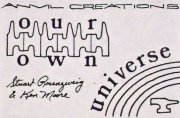 |
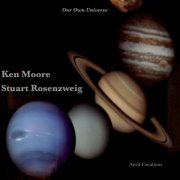 |
Our Own Universe (1981, recorded 1976, 61.37) ***/T½Our Own UniverseMay Pain is Nociception Twenty-Two Over Seven Pink 2 The Den of Iniquity |
Current availability:
Mellotron used:
Experimental synthesist Ken Moore teamed up with Stuart Rosenzweig for a pair of cassette-only albums in 1981. The first of these, Our Own Universe, is possibly at its best on the twelve-minute May and Pink 2, although (presumably) Rosenzweig's influence accounts for the (very relatively) more melodic approach than on Moore's solo work. Note: relatively.
Rosenzweig plays Mellotron on the fourteen-minute opening title track, with a warbly flute melody and string and cello parts drifting in and out of the mix. Moore has uploaded much of his back catalogue to Bandcamp, so you can hear this there, should you feel the need.
See: Ken Moore
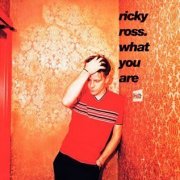 |
What You Are (1996, 45.48) ***/½ |
|
| Good Evening Philadelphia Icarus Cold Easter What You Are Radio on When Sinners Fall Jack Singer The Lovers |
Wake Up and Dream Rosie Gordon Lies So Still Promise You Rain Love Isn't Hard It's Strong |
|
Current availability:
Chamberlin used:
Ricky Ross? Who? Turns out he's the vocalist with Scottish pop/rock crew Deacon Blue (named for the Steely Dan track), the kind of band who pass under my radar, explaining my ignorance. Well, that's my excuse, anyway. Ross actually released a little-known solo album before joining the Deacon chaps, although 1996's What You Are is apparently generally regarded as his debut. It's a perfectly ordinary roots rock/pop album, to be honest, although 'singer-songwriter' might be a better description, as the songs are generally vehicles for Ross' lyrics, particularly acerbic on opener Good Evening Philadelphia. Actually, Springsteen might be a good comparison; the material here has that widescreen Americana feel to it, albeit with a Scots feel to it, rather than the usual Irish (yes, I know The Boss isn't Irish-American). I mean, we're always hearing about the Irish diaspora, but what about the Scottish one? Scots all over the world, not least my own ancestors.
Patrick Warren does his usual Chamberlin thing, although all I can spot is a brief flute part on Jack Singer. Overall, this is far better than I'd expected, although, unless you're into Ross' lyrical take on life, the universe and everything, you may not find the actual music that exciting, let alone the minimal Chamby use.
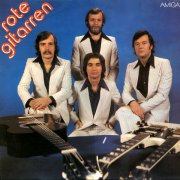 |
Rote Gitarren (1978, 39.07) **/T |
|
| Weißes Boot Draußen Bei den Weiden Hochzeit Wir Ziehen Weiter Ein Guter Tag Auf dem Dach Dieser Welt Sie Heißt Anna Weißt du Noch |
Kuchen auf den Tisch Schon ein Jahr Das ist ein Tag Purpurrote Segel |
|
Current availability:
Mellotron used:
Poland's Czerwone Gitary (Red Guitar) found success next door, geographically speaking, in Communist-era East Germany (a.k.a. the laughably-named 'Deutsche Demokratische Republik'), re-recording some of their catalogue in German for that market, re-naming themselves Rote Gitarren for the project. Their eponymous 1978 release, despite the cover pic of the guitarist's cool white Gibson twin-neck (the only one behind the Iron Curtain?), is about a half step away from schlager, a distinct oom-pah rhythm apparent in several of its tracks. It's at its least bad on Sie Heißt Anna and closer Purpurrote Segel, but, believe me, that isn't saying much.
Bandleader Seweryn Krajewski played keys, presumably including the Mellotron, probably Amiga Studios' M400, with background strings on Sie Heißt Anna and rather more upfront ones on Das Ist Ein Tag. Do you need to hear this? You do not.
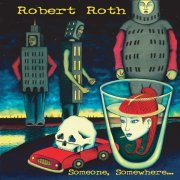 |
Someone, Somewhere... (2004, 71.54) ***½/TTT |
|
| Vicki and Jacky Someone, Somewhere... Relive These X The Poison Arrow The Call of the Wild Streetplay '99 Lightning & Thunder Blackout City Serenade |
Halliburton Blues Walk All Over Downtown Life Laugh Til We Cry L&T 2 Under the Ever-Watchful Eye Real Life Story Yesterday's War |
|
Current availability:
Mellotron used:
2004's Someone, Somewhere... is, I believe Robert Roth (variously of Built to Spill and Truly)'s only solo album to date, a kind of singer-songwriter-from-the-grunge-era release, albeit in a good way. Its contents shift between more straightforward (kind of) pop/rock (opener Vicki And Jacky, The Poison Arrow, L&T 2) through to a more psychedelically-influenced thing (the title track, Halliburton Blues, Under The Ever-Watchful Eye), alongside several less easily-categorisable things. It has to be said, though, the album's too long and could've done with a good edit. One man's opinion...
Roth plays his own M400 throughout, with background strings on Vicki And Jacky (plus flutes on the fade), flutes and strings, variously, on the title track, skronky string and flute parts on Streetplay '99, occasional strings on Blackout City Serenade, flutes and strings on Laugh Til We Cry and choppy strings on L&T 2, while it's very possible it's hidden in the mix on anything up to several other tracks. A decent enough album, then, with some fine Mellotron use. Recommended.
See: Built to Spill | Truly
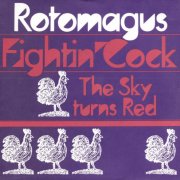 |
7" (1971) ***½/T Fightin' Cock The Sky Turns Red |
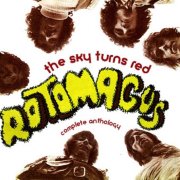 |
The Sky Turns Red: Complete Anthology (2011, recorded 1969?-197?, 61.58) ***½/T |
|
| Laureline Little Green Man Fighting Cock The Sky Turns Red Runnin' for Life I Dig Life Shout Now Hello the Binaries The Flufluting Flatmul |
Le Haut du Pavé Nevada Eros Madame Wanda Fighting Cock The Sky Turns Red Laureline Porqoui les Hommes |
|
Current availability:
Mellotrons used:
Rotomagus, monikered for the Roman name for their home town, Rouen, are proof that, even now, there are an almost uncountable number of obscure bands ripe for rediscovery. Their history is convoluted, to say the least: from 1968 pop act through a brief psychedelic phase to raw-as-fuck hard rock, and all in three or four years. 2011's The Sky Turns Red: Complete Anthology does what it says on the tin, kicking off with their unreleased 1971 demo album, a crudely-recorded document of a band feeling their way through a brand-new genre in a country that never really took rock to its bosom. It's no great surprise that none other than Julian Cope apparently completely freaked out on hearing this. The set is completed by eight tracks, six of them single A- and B-sides (are the last two an unreleased single?), making for a mildly schizophrenic listening experience, as they shift between three wildly divergent styles in the space of fifteen minutes.
Which brings us on to the reason this is here: The Sky Turns Red, the flip of Fightin' Cock, their third (and only hard rock) single, contains a drifting Mellotron string part, possibly an M300, probably played by one of the Peresse brothers, Pierre or Sylvain, plus a flute line and upfront strings on Porqoui [sic.] Les Hommes. It'd be difficult to recommend this on Mellotronic grounds, but it's a fine document of an unfairly obscure act.
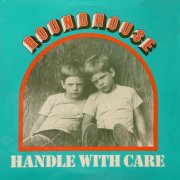 |
Handle With Care (1976, 36.53) ***/T½ |
|
| Handle With Care Treat Me Right Home Town Dirty Bar Rainbow (Lost the Sky) City of the Dead Think Once I Was Lonely After Daybreak |
Oooh Yes Testimony, the (of H. Hughes) |
|
Current availability:
Mellotron used:
Roundhouse (or Round House - it's spelled both ways on the sleeve) were a one-shot psychedelic hard rock band from as late as 1976, leaning towards the era's mainstream rock sound that was about to become obsolete. Led by vocalist/guitarist Brian Kent (the label actually states 'Roundhouse featuring Brian Kent'), they were, of course, destined to go precisely nowhere, although their sole legacy to the world (to my knowledge), Handle With Care, has its moments, not least Rainbow (Lost The Sky) and energetic closer Testimony, The (Of H. Hughes) and yes, that's how it's written on the sleeve.
Kent plays Mellotron, along with 'guitar, vocals, piano and general hysteria', with strings on the opening title track and strings and raucous cellos on Rainbow (Lost The Sky), although two or three other tracks that could have benefitted from its inclusion are left Mellotronless, which is a shame. Anyway, although copies of this do turn up on eBay, any in good enough condition to play are going to be prohibitively expensive, so I'd search out a download if you absolutely have to hear it.
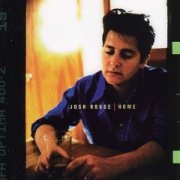 |
Home (2000, 38.08) **/½ |
|
| Laughter Marvin Gaye Directions Parts and Accssories 100m Backstroke Hey Porcupine In Between And Around |
Afraid to Fail Little Know it All |
|
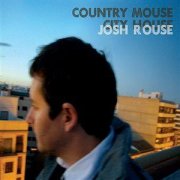 |
Country Mouse City House (2007, 38.30) **/TSweetieItalian Dry Ice Hollywood Bass Player God, Please Let Me Go Back Nice to Fit in Pilgrim Domesticated Lovers London Bridges Snowy |
Current availability:
Chamberlin/Mellotrons used:
Josh Rouse seems to be regarded as a folk/roots-type of guy, but going by his third album, 2000's Home, I'd lump him into the 'bland singer-songwriter' category. I'm afraid to say, the album's faster tracks expose his limitations, while the slower ones are just dreary, making any attempt at locating a 'best track' a bit hopeless. Brad Jones plays Chamberlin, with background strings on Directions, so while there may be more hidden away somewhere (hey, you know how it is with the Chamby...), I can't hear 'em.
2007's Country Mouse City House is another insipid effort that actually gets worse as it progresses, its least bad tracks (Sweetie and Hollywood Bass Player) being at or near the beginning. Mellotronically speaking, the album opens with a lovely flute part on Sweetie, with choirs later on from Paco Loco, while Joe Pisapia adds strings to closer Snowy to rather lesser effect.
So; Home is merely boring, with next to no Chamby, while Country Mouse City House is actually pretty bad. Don't bother. No, really.
See: Samples etc.
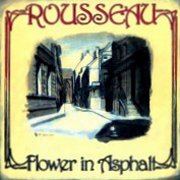 |
Flower in Asphalt (1980, 37.13) ***½/T½SkylightGlockenrock Flower in Asphalt Le Grand Rêveur Entrée Fool's Fantasy Dancing Leaves |
Current availability:
Mellotron used:
Rousseau, despite their name, were German (the name came from their admiration for the French philosopher) and played a typically German style of progressive rock; instrumental, not over-complex, but melodic. Not the sort of music that's going to make you leap out of your seat with amazement, but when you need to kick back, Flower in Asphalt is one of those albums that lets you relax and go with the flow. Apart from closer Dancing Leaves, none of the pieces far exceeds five minutes; the CD booklet says the band members were enthralled after seeing Camel and it shows, though not in a bad way.
The keys were pretty standard for the time: piano, organ, synth, string synth and, of course, Mellotron, though I've no idea if the band actually owned the machine used on the album. I don't think I'll ever work out why there was such a reaction against the Mellotron string sound around this time; maybe because of the eight-second limit, which, admittedly, is far from ideal for the sort of Floyd-y, long sustained chords favoured by many bands, particularly in Germany. Anyway, Rainer Hoffmann's Mellotron use seems to be restricted to choir on several tracks (all the flute on the album is real) and doesn't amount to much more than block chords used to reinforce the more epic passages. Mind you, since when was that a problem? It's difficult to single out any particularly outstanding use, but the chords in Fool's Fantasy have an ethereal quality missing from the other relevant tracks.
Rousseau made another two albums, but both 1983's Retreat and '86's Square the Circle (which is pretty terrible, to be honest), are resolutely Mellotron-free. Don't come to Flower in Asphalt expecting to be blown away, but it's a decidedly pleasant album, although the Mellotron work is rather too low-key for my tastes.
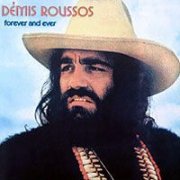 |
Forever & Ever (1973, 37.44) **/T½ |
|
| Forever and Ever My Friends the Wind My Reason Lay it Down Lovely Sunny Days Lost in a Dream Velvet Mornings Rebecca |
When I am a Kid Good Bye My Love Good Bye |
|
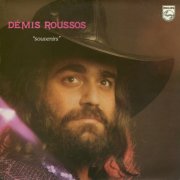 |
Souvenirs (1975, 37.02/67.44) **/0 (½) |
|
| Sing an Ode to Love Midnight is the Time I Need You I'll Be Your Friend (Schön Wie Mona Lisa) Action Lady Winter Rains From Souvenirs to Souvenirs Trying to Catch the Wind White Wings (Asa Branca) Tell Me Now |
Names Perdoname [CD adds: A Flower's All You Need I Like the World Yellow Paper Ulysses Mara The Secret in Her Eyes] |
|
 |
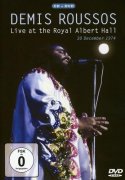 |
Double Live [disc 1, a.k.a. Live at the Royal Albert Hall] |
|
| Intro - I Want to Live Forever and Ever O My Friends You've Been Untrue to Me Let it Be Me My Friend the Wind Say You Love Me When I'm a Kid Velvet Mornings |
With You Goodbye My Love Goodbye Lovely Lady of Arcadia Someday Somewhere My Only Fascination A Thousand Years of Wondering Song of Goodbyes (Sing an Ode to Love) |
||
Current availability:
Mellotrons used:
I've been dreading playing Forever & Ever; I bought it six months ago and have been putting it off ever since. I paid A$1.00 for it in a crummy shop in Perth, to the extreme consternation of my mate (hi, Stuart), who had only pointed it out for a laugh and couldn't believe it when I picked it up... OK, it's not good, but with the benefit of thirty-odd years' hindsight, an album of Demis Roussos ballads sounds quite harmless compared to some of the utter dreck to which I've subjected myself lately. Roussos (1947-2015), of course, was a member of the mighty Aphrodite's Child (bit of a shocker when I discovered that, many years ago), along with Vangelis, but, after their demise, swiftly moved into the realms of Large Greek Balladry, delighting and horrifying Europeans in approximately equal quantities. Yeah, this is pretty cruddy, but largely drifts past without overly offending in the process. Modern dross take note.
 |
|
| M400 at the Albert Hall | |
Surprisingly, maybe, the album doesn't entirely comprise cheesy ballads, Lay It Down being an energetic pseudo-rocker, with rather duff girly backing vox, while Rebecca actually has proggy touches, although, er, the other eight tracks all seem to be cheesy ballads, at which I shouldn't be entirely surprised. They obviously couldn't afford a real string section for the whole album, with the exception of closer Good Bye My Love Good Bye, so S(tylianos) Vlavianos plays Mellotron on several tracks, with strings and flutes on the title track and Lovely Sunny Days and a particularly strident string part on Lost In A Dream, although the album's brass parts are real.
I (thankfully) haven't heard '74's My Only Fascination, but the following year's Souvenirs is exactly what you'd expect of a mid-'70s Roussos effort, largely consisting of minor variations on the expected balladry (opener Sing An Ode To Love, From Souvenirs To Souvenirs, nearly everything else). His default setting is, however, offset by Midnight Is The Time I Need You and Action Lady's Euro-disco and Trying To Catch The Wind's soft rock, amongst other aberrations, all laden with yer man's tremulous falsetto. The CD edition's bonus tracks do little to improve the album's reputation, A Flower's All You Need being a particularly odious example, complete with children's choir, who hit notes only dogs can hear, not that I'd imagine they'd want to. Mellotron? Another bonus, the twelve-minute (!) Ulysses, is an outtake from Forever & Ever, a Demis-goes-prog (!) number, more Aphrodites Child than solo Roussos, Mellotron strings on its first section. I can't honestly recommend this album, but listen to Ulysses' mad genius on YouTube and marvel at the direction in which his career could have gone.
Thinking about it, Demis' music always tended towards the (melo)dramatic, so I suppose a live Mellotron was pretty much a given. Disc one of 1999's Double Live (a.k.a. Live at the Royal Albert Hall CD/DVD) does what it says on the tin, a recording of a (complete?) Roussos set from around the time of his third release, My Only Fascination. Is it, y'know, fairly crummy? Yes and no! Most of it's the expected cheeso balladry, but Demis had a flair for bringing in Aphrodites' prog influences, notably on the thirteen-minute A Thousand Years Of Wondering, which is actually, er, pretty good, other not-terrible material including effective opener I Want To Live and O My Friends You've Been Untrue To Me, in other words, the set's longest songs. Organist John Turner plays Mellotron like it's going out of fashion (which, indeed, it was soon to do), getting some in on almost every track, with (deep breath) choirs on Intro - I Want To Live, background strings on Forever And Ever and Let It Be Me, more upfront ones and choirs on O My Friends You've Been Untrue To Me, background strings and upfront choirs on My Friend the Wind, strings at the end of Say You Love Me, choirs on Velvet Mornings, occasional strings on With You, chordal flutes and strings on Goodbye My Love Goodbye, strings on Lovely Lady Of Arcadia, Someday Somewhere and My Only Fascination, huge choirs and strings on mini-epic A Thousand Years Of Wondering and, finally, choirs on Song Of Goodbyes. Phew! I wouldn't go as far as actually recommending this, but, in its own way, it's a Mellotron-lover's delight.
So; I can't imagine why you'd want to own copies of these - oh, you don't? Well, Demis is hardly ripe for reassessment, but Forever... was a far less unpleasant experience than I'd been expecting, for which I am truly grateful. Passable Mellotron on a few tracks, too, which is always a bonus. Incidentally, note the writing credits: several tracks mention a certain 'Ch. Chalkitis', clearly the legendary Harris Chalkitis, probably the first artist to get a really rippingly bad review on this site.
See: Aphrodite's Child | Harris Chalkitis
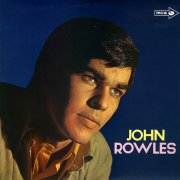 |
John Rowles (1968, 34.24) **/T |
|
| By the Time I Get to Phoenix Domino If I Only Had Time It Takes Two Lonely Street Only You Honey Walk in the Sun |
I Really Don't Want to Know Do it Love in the World Dock of the Bay |
|
Current availability:
Mellotron used:
John Rowles (OBE!) is a Kiwi singer of the Gary Puckett school, all sonorous tones and overblown, string-laden ballads. Think: a less eclectic (and iconic) Scott Walker. 1968's John Rowles was recorded in London, arrangements and production handled by Mike 'future Gary Glitter collaborator' Leander. It can only really be described as a product of its time, minus the previous year's experimentation, at its least dull on his version of Dock Of The Bay and its worst on the maudlin Honey (Bobby Goldsboro hit with it the same year and again in '75). Incidentally, the sleeve photo makes him look like a Thunderbirds puppet; a ploy to sell the album to Gerry Anderson's legions of fans?
Perhaps surprisingly, the era's usual unknown sessioneer plays Mellotron flute and string parts on the album's hit (UK no. 3, it seems), If I Only Had Time, adapted from Michel Fugain's Je N'Aurai Pas Le Temps. Why the Mellotron, when the rest of the album utilises real strings? Who knows? A different recording session? It's no better than the rest of this sorry effort, anyway.
 |
Have a Nice Day (1999, 55.19) **½/½ |
|
| Crush on You Wish I Could Fly You Can't Put Your Arms Around What's Already Gone Waiting for the Rain Anyone It Will Take a Long Long Time 7Twenty7 I Was So Lucky |
Stars Salvation Pay the Price Cooper Staring at the Ground Beautiful Things |
|
Current availability:
Mellotron used:
Roxette, a.k.a. Marie Fredriksson (1958-2019) and Per Gessle, named for the Dr. Feelgood song (thought so!), formed in 1986, breaking through two years later with Look Sharp! In case you've never heard them (unlikely, I know) they play a really mainstream kind of pop/rock, short on innovation but long on catchy hooks. Have a Nice Day is their sixth original album, ignoring the album of Spanish-language ballads (get the picture?) and sounds like... a late-'90s pop album, complete with occasional techno influences, as was de rigeur at the time. While desperately unexciting, it's also not entirely appalling, much of it drifting by harmlessly, probably at its best on opener Crush On You and the jaunty Waiting For The Rain.
Clarence Öfwerman plays all kinds of devices, as he has on Gessle's solo albums, including Mellotron on Fredriksson's Waiting For The Rain. The track's real strings obscure a lot of detail, but a handful of chordal flute parts pop up here and there, although whether or not the Mellotron's real can only be a matter for conjecture.
See: Per Gessle
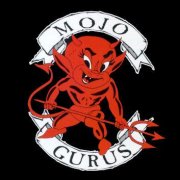 |
Mojo Gurus (1998, 49.38) ***/T |
|
| Tiger Lily Strawberry Wine Blues for Maryjane Mojo Guru I Walk Alone Rave on Magic Carpet Ride Baddest Mother's Son |
Gotta Move Ballad for a Blue Guru Come on Into My Kitchen Shine a Light - This Little Light of Mine Daddy's Farm Red Rose |
|
Current availability:
Mellotron used:
Originally forming as far back as 1982, Roxx Gang's fourth album in a decade, 1998's Mojo Gurus, caught them on the cusp of mutating into a band named for the album. It apparently sounds little like their earlier work (and only has one member in common with it), being more of a sleazy blues-rock album than their previous glam metal style, better tracks including the porch-blues of Blues For Maryjane, the epic folk/blues of I Walk Alone and acoustic closer Red Rose, although the mid-paced Strawberry Wine goes on approximately forever and not in a good way.
Howard Helm plays what might just be genuine Mellotron string and flute parts on Red Rose, the sounds having more of an edge to them than the era's samples. I'm not going to say, "Best thing I've ever heard, squire", but this is a decent enough effort, if not especially for its Mellotron use.
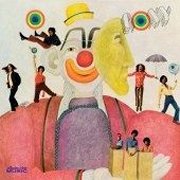 |
Roxy (1969, 31.19) **½/T |
|
| Love, Love, Love Sing a Song New York City Somebody Told You Love for a Long Time Windy Day You Got a Lot of Style I Got My Friends |
Yesterdays Song Rock and Roll Circus |
|
Current availability:
Mellotron used:
The little-known Roxy were precursors of the better-known (at least in the States) Wackers and were the first band that outfit's Bob Segarini and Randy Bishop played in together. They were apparently a blast live, but their sole, eponymous album has too many rather dreary, countryish efforts like Somebody Told You or You Got A Lot Of Style to be considered a particularly good listen today.
Someone, probably Segarini, plays a Mellotron on Yesterdays Song [sic.]; according to the CD liner notes, Elektra's president, Jac Holzman, brought one over from the UK, so the band dug it out and stuck it on the track. The song's harmonium actually takes 'best keyboard' award on the track, but the Mellotron's flutes and faint strings add enough to make it worth hearing if you're listening to the album anyway. I can't honestly say this is that great a listen, though, unless you're into the kind of mainstream stuff the band were peddling, or are a dedicated Wackers fan (huh?) who has to own everything connected with the band.
Roxy Music (UK) see: |
 |
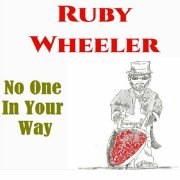 |
No One in Your Way (2023, recorded 1972, 47.47) ***/TTT |
|
| I Think it's Time Rainman Turnabout Question Understand I'm the Man China Doll Good Time Sally Dream Maker No One in Your Way |
Lovely Lady Separation |
|
Current availability:
Chamberlin used:
Ruby Wheeler (band, not person) hailed from the LA area, existing for a couple of years in the early '70s. They were lucky enough to secure funding to record an album's-worth of material—not that it did them much good, as the tapes languished in obscurity for decades, until Gear Fab resurrected them in 2023 as No One in Your Way. Sad to say, the reason for their obscurity becomes obvious upon playing the end result: they were, at heart, a West Coast soft rock band of no particular talent. The album's perfectly acceptable, in its own way, but desperately unexciting, probably at its best on punchy opener I Think It's Time, the slightly more gutsy China Doll and the title track.
David Mohr played Chamberlin, amongst other 'boards, with a string line following the real flute on I Think It's Time, background strings on Rainman, upfront ones on Dream Maker, complete with pitchbend and major flute and string parts on the title track and closer Separation, although the uncredited flute on Turnabout Question sounds real.
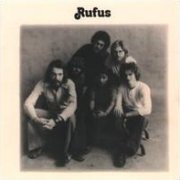 |
Rufus (1973, 42.11) ***/TT |
|
| Slip n'Slide Keep it Coming There's No Tellin' Maybe Your Baby I Finally Found You Feel Good Satisfied Haulin' Coal |
Whoever is Thrilling You (is Killing Me) Medley: Love the One You're With/Sit Yourself Down |
|
Current availability:
Mellotron used:
Rufus are remembered these days as Chaka Khan's jumping-off point, although she wasn't even a founding member of the band. She was already installed when they recorded their eponymous 1973 debut, though, dominating the vocal area, despite the occasional male lead. Surprisingly, it isn't the funk-fest you'd expect from their later work, being more of a blues/soul concoction with a funk feel on some tracks, although opener Slip n'Slide is essentially rock'n'roll and Maybe Your Baby is more electric blues than anything.
Ron Stockert plays Mellotron, with cellos and strings on There's No Tellin', strings and flutes on I Finally Found You and a triumphal string part at the climax of Haulin' Coal. Given the lack of real strings on the album, the Mellotron was probably employed as a substitute, possibly making itself more useful than expected once Stockert actually sat down at the thing. Anyway, Rufus is not an album you need to hear if you don't get on with the more soulful end of things, although it contains some unexpectedly worthwhile Mellotron work.
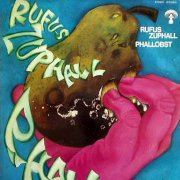 |
Phallobst (1971, 36.45) ****/TClosing TimeWenn Schon, Denn Schon Schupfner Waste Land Makröjel Prickel Pit Portland Town I'm on My Way |
Current availability:
Mellotron used:
Rufus Zuphall's Phallobst was their second and last album and, for most of its length, could be described as an interesting blues/prog hybrid, with a clean but punchy guitar sound, very distinct from the band's heavier contemporaries. The material's good, the style unusual, the playing excellent; what's not to like? OK, so it hasn't dated that well, but compared to the type of acid folk that Germany was chucking up at the time (Emtidi, Hölderlin etc.), it hasn't actually done too badly and I can see this becoming a minor favourite if I ever find the time to play it more often.
Guitarist Günther Krause doubled on Mellotron (Dieter Dierks' studio's machine), although he hardly used the thing, to be honest, with no more than a brief burst of brass at the beginning of Portland Town and some more obvious strings on closer I'm On My Way, but nothing to get too excited about. So; a good, unique album, worth it for the progressive fan who wants something slightly different. Long Hair's CD version has the second half of a bloody good gig, 'Live Aachen '72' (part one is tacked onto the reissue of their debut, Weiß der Teufel), which is, of course, Mellotron-free.
 |
A Wizard, a True Star (1973, 55.56) ****/T½ |
||
| International Feel Never Never Land Tic Tic Tic it Wears Off You Need Your Head Rock and Roll Pussy Dogfight Giggle You Don't Have to Camp Around Flamingo Zen Archer |
Just Another Onionhead; Da Da Dali When the Shit Hits the Fan; Sunset Blvd Le Feel Internacionale Sometimes I Don't Know What to Feel Does Anybody Love You? Medley I'm So Proud Ooh Baby Baby La La Means I Love You Cool Jerk |
Hungry for Love I Don't Want to Tie You Down Is it My Name? Just One Victory |
|
 |
Todd (1974, 66.53) ***½/½ |
|
| How About a Little Fanfare I Think You Know The Spark of Life An Elpee's Worth of Toons A Dream Goes on Forever Lord Chancellor's Nightmare Song Drunken Blue Rooster The Last Ride Everybody's Going to Heaven/King Kong Reggae |
No. 1 Lowest Common Denominator Useless Begging Sidewalk Cafe Izzat Love? Heavy Metal Kids In and Out the Chakras We Go Don't You Ever Learn? Sons of 1984 |
|
Current availability:
Mellotrons used:
Todd Rundgren is known for recording albums entirely solo, a practice which reached its apogee with Faithful, where he attempted to recreate classic songs to the point where they were indistinguishable from the originals, meaning it's hard to know who's playing what on his albums. On the offchance you've never heard any of his stuff, he's wildly eclectic and on a good day, a truly brilliant pop writer, although his career contains far too much faff for him to ever be really consistent. Starting with The Nazz in the late '60s, he worked his way through two albums with Runt at the beginning of the '70s, before striking out on his own, then forming Utopia, while running his solo career concurrently. Confused?
A Wizard, a True Star is regarded by many as his peak, with songs of the quality of International Feel and Is It My Name?, although it has to be said that at nearly an hour, it's a little overlong and a little editing may have been in order. As far as the Mellotron's concerned, although I've had people swear blind he never used one, all I can say is: listen to the highlighted tracks above. It's difficult to tell on Sometimes I Don't Know What To Feel until the end of the song, where it's quite clearly Mellotron strings and they're all over the Medley, a rather unnecessary combination of four soul tracks. It may well be elsewhere on the album, too, but it's extremely difficult to tell, given the denseness of the production.
The following year's Todd is more of the same, musically, with killer songs like An Elpee's Worth Of Toons and Useless Begging vying for space with bizarre tracks like the Gilbert and Sullivan spoof Lord Chancellor's Nightmare Song. I'm assuming it's Mellotron strings again on The Last Ride, but I wouldn't actually stake anything really important on it and if it is, it might also be elsewhere. Who knows?
Rundgren's had a long and honourable career and is still doing it now, albeit to a smaller audience. I wouldn't absolutely swear that either of the above albums absolutely, definitely contains Mellotron, but it seems likely. As to whether he used one on anything else... More news should I ever get a fuller story.
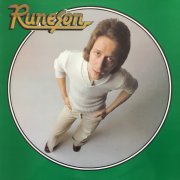 |
Runeson (1974, 39.18) ***/T½ |
|
| Fredag Kväll Tob, My Friend Just Dig In a Fantasy I'm Not a Poet Her Seventh Floor Longleg Realize |
Jenny Child Längtans Väntan Eftermiddagsvind |
|
Current availability:
Mellotron used:
Nils-Åke Runeson began his sporadic musical career with the mostly-English-language Runeson, surprisingly decent for a mainstream pop release, at its best on the gentle Just Dig, the rocky I'm Not A Poet, complete with de rigueur manic guitar solo, Realize and closer Eftermiddagsvind. Downsides? The hokey Longleg, with its faux-country moves.
Runeson plays Mellotron (probably Abba's M400, given that this was recorded at Polar) on two tracks, with 'in the mix' strings on Tob, My Friend and slightly more upfront strings and flutes on I'm Not A Poet. No classic, then, but a great deal better than expected.
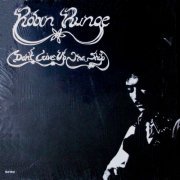 |
Don't Give Up the Ship (1974, 33.44) ****/TTFrom the SeaLife Has Just Begun Corrente Son Keeps Shining The Ship Fur Elise/Minuet/Bouree Allegro/Study in D/Long Long Ago Prelude/Laura's Theme Country Here I Come |
Current availability:
Mellotron used:
Robin Runge's first (?) album, 1974's Don't Give Up the Ship, has caused some confusion in collecting circles, as his follow-up release, three years later, bears exactly the same title. Huh? Having not heard the later version, I can't comment, but the '74 album is, most surprisingly for a Christian release, a beautiful (if rather amateurishly recorded) record, largely consisting of Runge's lovely acoustic guitar work, sounding (as other reviewers have pointed out) slightly like the quieter tracks from Yes' contemporaneous work, its best tracks including opener From The Sea and Runge's pair of classical segues, Fur Elise/Minuet/Bouree and Allegro/Study In D/Long Long Ago.
The album opens with over a minute of solo Mellotron strings and flutes from Runge himself, while John Salmon adds more of the same to Son Keeps Shining (v.droll, chaps), although, sadly, they elected not to use it anywhere else. This must have the highest star rating of any 'Christian' album on this site; it seems odd referring to a mostly instrumental album as such, but its pair of vocal tracks land it in that category, so there it is. This is really very good indeed; although unavailable officially, it's doing the rounds on download blogs - just take care to grab the right version. Runge apparently went on to record CCM albums the following decade as Robin Crow, a fact you can probably forget immediately. Remember him for this superb effort instead.
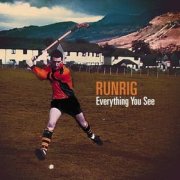 |
Everything You See (2007, 48.59) ***½/T |
|
| Year of the Flood Roadtrip Clash of the Ash The Ocean Road Atoms An Dealachadh This Day Sona |
Something's Got to Give And the Accordions Played In Scandinavia |
|
Current availability:
Mellotron used:
Before I start, I must apologise to Runrig for listing their country of origin as 'UK'; if ever a band deserved to be called 'Scottish', it's them. I mean, two members have actually left the band to go into Scottish politics, at least one of them on the devolution side. Quite how well Scotland would/will do devolved from the rest of the so-called 'union' remains to be seen and I expect we will eventually see it. And when we do, Runrig will play the independence celebrations.
For a brief period in the mid-'80s, I quite liked the band, buying a couple of albums and even going to see them once or twice. My enthusiasm waned after I realised that their music was featuring a growing element of AOR/stadium rock, mixed with their patented Celtic thang, but 2007's Everything You See is actually pretty decent. Not dissimilar to the sample-using The Stamping Ground, it finds a good balance between their Gaelic heritage (the band come from the Isle of Skye and are native Gaelic speakers) and their more anthemic side. I'm not sure how it occurred, but they contacted noted Edinburghian Mellotron owner Mike Dickson about the use of his M400, their keys man Brian Hurren ending up recording it onto a laptop in Mike's front room. Anyway, we get background strings on The Ocean Road, This Day and In Scandinavia (the album's best track?), quite upfront for a few brief seconds on the last-named.
You'd need a heart of stone (yes, even colder than mine) to dislike this album. Runrig's evident joie de vivre spills over onto their records; it's not difficult to see why they're such a major live attraction these days. There's not a lot of the mighty M400 here, but I really can't see that being a reason for anyone to buy this, anyway. If you like Runrig and haven't heard this, do so.
See: Samples etc.